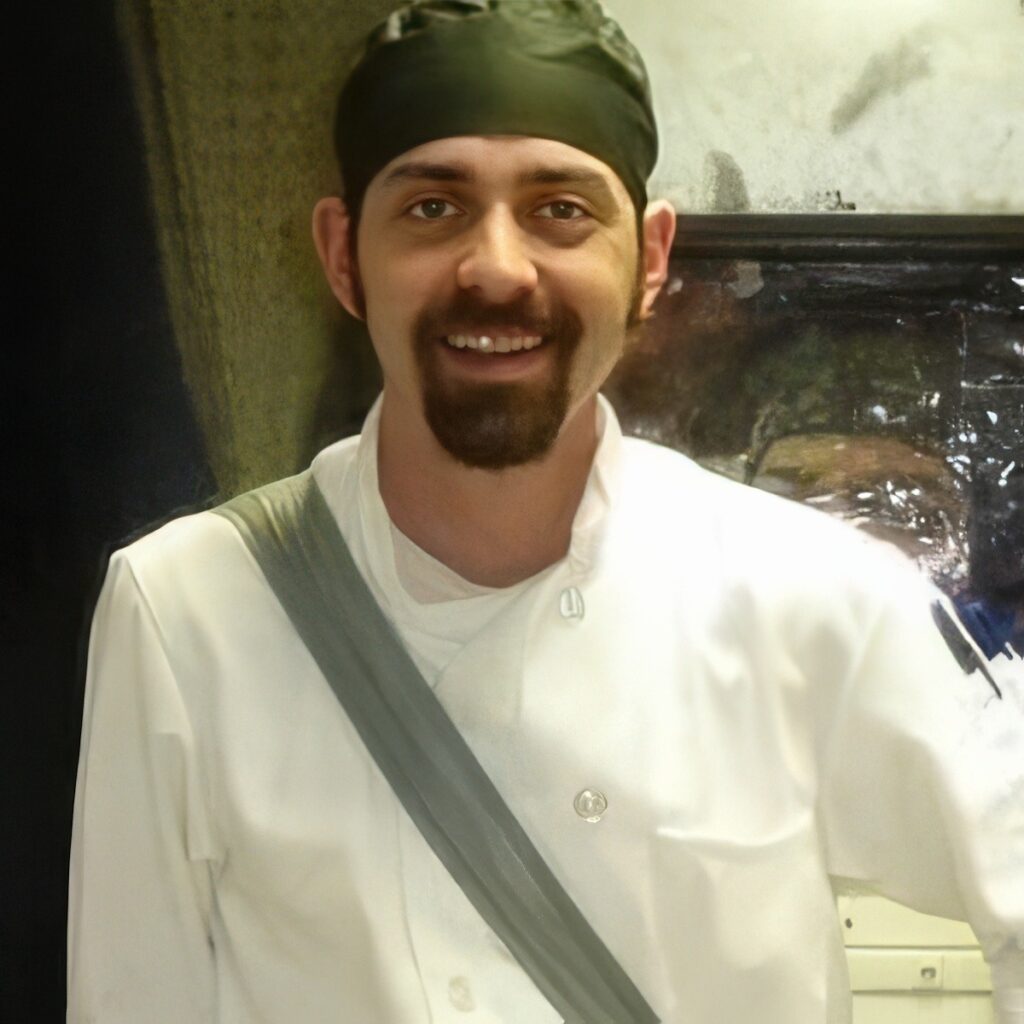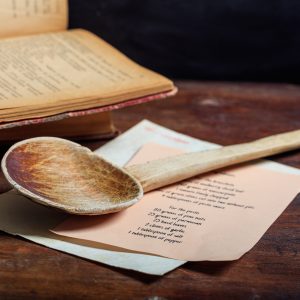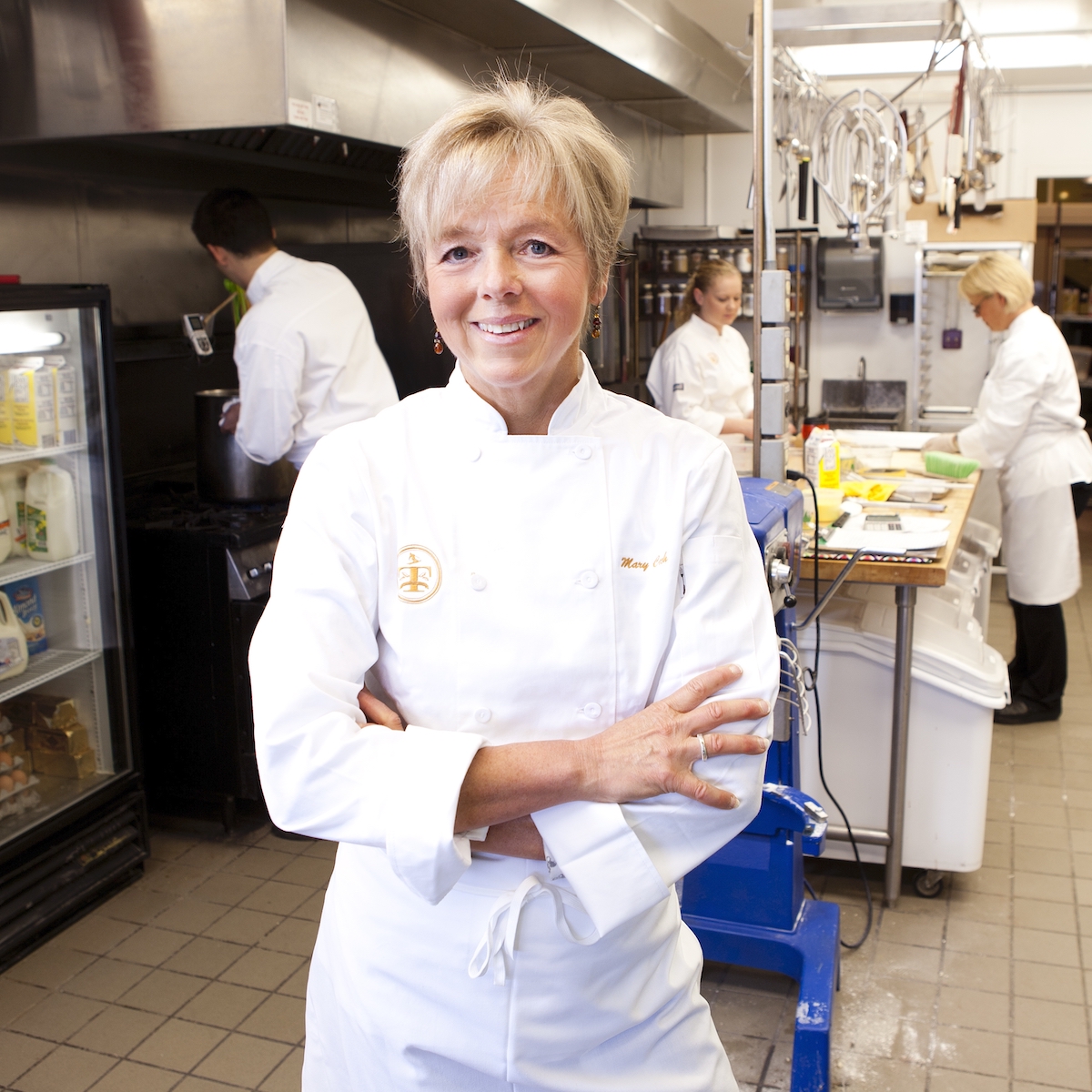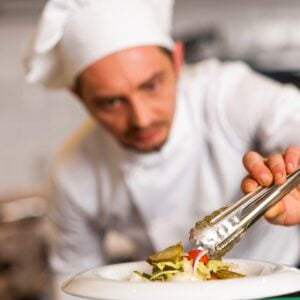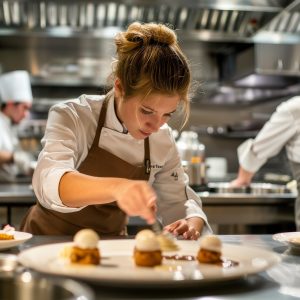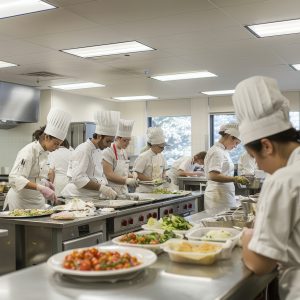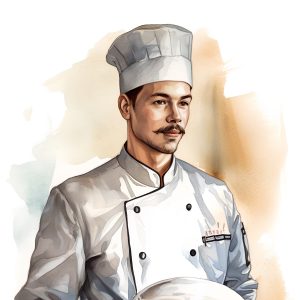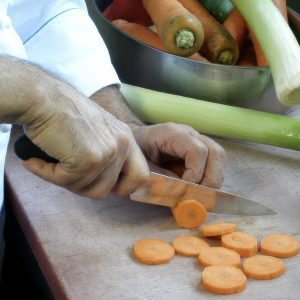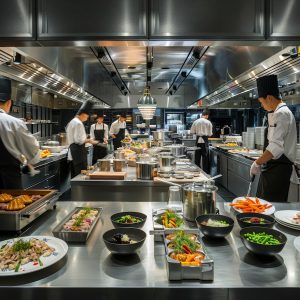“There are going to be people who know more about food and recipes, can prep faster and will generally outperform you in the kitchen but you need to live your dream. – Culinary Student Greg Cerretani
Interview with Greg Cerretani
For several years, I have been involved with Chef David Nelson’s Chef4Students.org. In this non-profit organization, grant money is given out to a culinary student in need of financial assistance. This year, I had the pleasure of sponsoring a grant for Gregory Cerretani, a culinary student currently enrolled in Le Cordon Bleu College of Culinary Arts in Boston.
We learn a little about the applicants from the 500-word essay they must write, plus letters of recommendation and transcripts. When I read Greg’s essay, I knew he would get my vote. After reading his responses to my interview questions, I know why he stood out. His passion for food and how it is prepared jumps out from his words and makes me want to keep reading. After reading Greg’s responses, I was inspired to run to the kitchen and start cooking something.
Greg is currently in Colle di Val d’Elsa, about an hour south of Florence, Italy, working on an externship associated with his school. He is living his lifelong dream of living and adding to his culinary skills in the home of his family heritage. You can read about his culinary adventures while there on his blog called Lessons From The Motherland
Whether you are thinking of going to culinary school or just need a little motivation to help you prepare tonight’s meal, read this interview with Greg. I know you are going to love it.
Here’s my interview with this up-and-coming culinary star, Greg Cerretani
In your application essay, you talked about growing up in a third generation of a large Italian family of grocers. What about your family’s work with food sparked an interest for you in the culinary world?
Growing up in a family of grocers we always sold off the best product and brought home whatever didn’t’ sell well and the scraps from the butchery work. Even as a young child at my Nana’s apron strings, I was incredibly impressed at her ability to take what one person may view as trash and turn it into some of the best food I have ever tasted. She never threw anything away in the kitchen and always found a use for every little scrap of food that came her way.
As I grew older and saw some of the store’s inner workings of the store itself, I was instilled with a deep respect for food. I was learning about rotating inventory and the idea of First In, First Out before kindergarten. I watched my father, uncles, and grandfather build displays of meat, fruits, and vegetables, and I still get transported to those moments every time I plate up a dish. As I got older, I realized that not everyone had the same love of and respect for food as my family.
Do any specific stories come to mind?
My Nana’s Sunday supper will measure every meal I eat for as long as I live. My great-grandfather had nine children, and each of his children married and had nine children. My father has seven brothers, one sister, and seventy-two first cousins, so having 30 or more people get together for Sunday supper was not unusual.
When I was too young to play football or baseball with my uncles, I would spend Sundays in the kitchen with my Nana. She cooked in army surplus pots, and the biggest pot was always reserved for the pasta sauce. Everything went into that pot: vegetable trimmings, pan drippings, beef fat caps, and chicken bones.
She never worked from a recipe, and I can’t remember her ever using a measuring cup, but her sauce was always the meal’s highlight. As I grew old enough to join in the games with my uncles, I always spent some time peeling garlic or stirring the sauce in the kitchen. I did everything I could to share in the creation of some of the most memorable meals I’ve ever had.
Whenever I prepare the family meals at my externship site, I always look through the trimmings and check our stock to see what we need to use up first and think to myself, “What would Nana do with this?”
You mentioned that at 29 years old, you decided to switch paths and pursue your passion by attending culinary school. Where were you working before? What ultimately made you decide to switch career paths and attend culinary school in your late 20s?
I had bounced around to different colleges and gone through eight different majors for nearly a decade. Every time I came close to completing a degree, I realized I had no real desire to pursue a career in that field and would start all over again with something else that I thought would be fulfilling.
I studied music, theater, psychology, and sociology, among other things, because they interested me enough to want to learn about them, but I never felt I could spend my whole life dedicated to any of them. I left school and took on an apprentice program in herbal medicine, which was extremely rewarding and life-changing. Unfortunately, there aren’t many jobs available for phytopharmacologists, so I took on different jobs that held my interest.
I worked as a short order cook, a filing clerk in a law firm, a store manager for a musical instrument shop, and worked in a restaurant supply company. For the six years before returning to school, I worked in construction for a family friend. I drove a box truck over a thousand miles weekly and fabricated seamless gutters on construction sites. I loved the guys that I worked with, and my boss is one of the greatest guys I’ve ever met, but I still wasn’t complete.
Nearly two years ago, I married my amazing wife, Tara, who saw that I was happiest when I was in the kitchen. She watched me drool while watching the Food Network and put up with me giving play-by-play announcements of what I would do differently while we watched Iron Chef together. She gave me the courage, support, and much-needed kick in the pants that got me chasing after my dream of culinary school.
I’m sure there are many factors to consider when choosing a culinary school. Why did you select Le Cordon Bleu of Boston? What were your most important features when deciding on a culinary school?
Le Cordon Bleu has always been the premier school in my mind. My grandmother on my mother’s side of the family would rush to the TV when Julia Child, a Le Cordon Bleu graduate, came on, and I would sit on her lap and watch with her as she enjoyed her cup of tea. It always amazed me how Julia Child could make these beautiful dishes that combined ingredients that everyone has in their kitchen and ingredients that seemed so foreign to me as a child, such as duck.
I was also mesmerized by the way she handled her knife. Every cut was so clean and well thought out that it seemed almost surgical, but she looked so natural while performing every cut. It was as if her knife was an extension of her hand, and she was incomplete without that part.
Regarding picking a culinary school, Le Cordon Bleu was first on my list of schools to visit. On the day of my tour, I was hypnotized as I walked through the production kitchens, and when I saw the equipment and realized that the majority of it had come from the restaurant supply company I had worked for, I took it as a sign and registered that day.
Many high school students and individuals are looking for a career change interested in the culinary field. What advice do you have for them about applying to culinary school?
My best advice is to believe in your dream and have a support system. It took me until I was 29 to enroll because of my own self-doubt, which you cannot afford to have as a culinarian. I needed the support and belief of my wonderful wife to overcome that hurdle.
There will be people who know more about food and recipes, can prep faster, and will generally outperform you in the kitchen, but you need to live your dream. Identify those people, watch them work, and befriend them. Some of my best friends from school are the people who intimidated me the most. By befriending them, I realized that there were things that I excelled at, and we taught each other little tricks at every opportunity.
Challenge yourself and those around you, and you will grow by leaps and bounds.
Are there any classes or jobs they should consider before applying?
I recommend working in a kitchen before culinary school. Having experience with knife cuts, kitchen equipment, and ingredients that may be foreign to you, especially line cooking, will be invaluable to you in classes. More importantly, working in a kitchen will help you decide if this is your career before you invest thousands of dollars in your education.
Any books they should read?
I thoroughly enjoy reading Anthony Bourdain’s books. I read them repeatedly, and each one is like an old friend. He doesn’t pull any punches regarding his depictions of the culinary lifestyle. He doesn’t gloss over the cuts, the burns, the heat of the kitchen or the long hours required of someone in this field. In his books, he discusses kitchens and cuisine from all over the world. He talks about Cape Cod dive bars and Michelin-rated restaurants with the same passion.
Along the same line, everyone interested in the culinary profession should have to read Heat by Bill Buford. This book tells the story of another career changer, like me, who tells his tale without skipping over the growing pains of climbing the culinary ladder. I also love the way he describes his infatuation with certain aspects of his learning experiences. It’s almost as if you are looking into a secret society in action when he describes the inner workings of his kitchen. Furthermore, having lunch at Dario Cecchini’s butchery brings back unforgettable memories every time I read that section of the book.
What cookbook influenced you most before you went to culinary school?
Growing up, James Beard’s American Cookery was my bible. My dog-eared hand-me-down copy is falling apart and is splattered with various sauces and greasy fingerprints and each stain reminds me of trying a recipe for the first time. Every time I have moved, I make sure that it is the last thing I pack so that it is the first thing I find when I open up that box labeled “Kitchen”. I love that he tells stories about where the recipes came from; it’s like talking with an old, trusted friend whenever I thumb through my copy.
I always loved that he didn’t give precise cooking times but rather described what a dish should look, sound, feel, or smell like when it was done. I’ve heard it said that “Cooking is art and baking is science,” and James Beard wrote his cookbooks like an art aficionado, with love and respect for the craft.
What cookbooks are you reading now that you have had some experience in the culinary field?
“The New Joy of Cooking”, Julia Childs’ cookbooks, and Alton Brown’s “Good Eats” have become mainstays in my home kitchen, and like every Le Cordon Bleu student, I have a well-loved copy of Gisslen’s “Professional Cooking”.
Now I use cookbooks more for inspiration than actually following the recipes. I read them in bed or during my spare time like some people read works of fiction. I wait for something to jump out at me, and then I will experiment in my kitchen at home and try to put my little twist on the original recipe.
I am mildly obsessive compulsive and keep one notebook beside the bed, one in the kitchen and carry another in my knife kit so that whenever I have an idea for a recipe or try something new I can write down the process and replicate it it later.
The first day of culinary school can be very intimidating. Was it like this for you? What were your first few days at culinary school like?
The days leading up to my first day at Le Cordon Bleu were very nerve-wracking. I spent two days on YouTube watching videos and trying to perfect tying my cravat, the chef’s choice of neckwear, which was part of our school uniform. I spent countless hours staring at the dimensions of cuts like brunoise fine and battonet and trying to commit them to memory. I am fairly sure I drove my wife crazy by handing her my textbook every night after dinner and having her quiz on me on things like the classical brigade and French cooking terms.
When I was driving in on the first day of class, I had a bit of a panic attack and was questioning my decision to return to school, thinking I was going to be the oldest guy in class. When I arrived, I found that I was smack-dab in the middle of the age groups and was not the only career changer in my class. I am very outgoing and made friends fast with people from every walk of life, which helped me greatly.
I also owe a great debt of thanks to the Chef Instructor who taught my first class, Chef Dave Lentini. He has an amazing sense of humor. I felt like he had a great understanding of when we, as students, felt overwhelmed. He would crack a well-timed joke that lightened the mood of the whole room before returning to his lecture or demonstration.
I imagine there are many challenges students face every day while in school. What has been your greatest challenge so far in school? How did you handle the situation?
I would say that the most significant challenge for me is that I am incredibly stubborn and have a food allergy. I am allergic to Iodine and, therefore, shellfish, crustaceans, and fish. My allergy is so bad that the vapors from sautéing certain types of seafood will give me an inhalation reaction, which makes me break out in hives, get lightheaded, and, in the worst cases, can make my throat close up and give me difficulty in breathing.
I find it very difficult not to be able to do something, so I push myself to my limits trying to keep up with everyone else. More than once, I made myself ill and had to leave the room to recover. One of my very best friends from Le Cordon Bleu, Dennis “The Deej” Belanger, pulled me aside one day and in no uncertain terms told me that he wouldn’t let me get away with pushing myself to the limit anymore.
He made it a point to speak up to the Chef Instructor when I would be assigned a job dealing with fish and didn’t remind them of my allergy. At first I was a little bit upset but I finally realized that being a professional cook means working with a team and looking out for everyone’s safety. It took some time for me to swallow my pride and walk away from dangerous situations but I learned a lesson that will stick with me for the rest of my career and life.
While there are challenges, there must be some rewarding experiences as well. What has been the most rewarding and significant experience you’ve been a part of since beginning classes?
The most rewarding experience for me came as a complete and utter shock. I was under the impression that one of my Chef Instructors, Michael Ciuffetti C.E.C., had it out for me. It seemed like he was going out of his way to make things difficult for me. When I would be finishing a dish for grading presentation he would tell me to give it away to another Chef to eat and then tell me I had a five to ten minute window to remake the same dish. When we were in the middle of our prep work he would give me an errand to run or tell me to assist another student before I could return to my own preparation. I did my best to not show my frustration but I kept questioning why he was making things so hard for me.
One day he cornered me in the walk-in refrigerator and told me that he already knew that I could cook and he wanted to see how I worked under pressure and that I passed his tests. From then on whenever he needed assistance with a project or had a special opportunity he would come and talk with me and give me a chance to go above and beyond what I had expected from my education.
After that day I made it my goal to challenge myself the way he had challenged me. He showed me that I could do more than I thought was possible of myself. When the chips are down and everything seems to be spiraling out of control I hear his voice in the back of my head.
You began working at Romano’s Macaroni Grill, held about every position in the restaurant in a year, and ended up as a shift manager. How did you manage to accomplish this? How do you handle working in a restaurant, attending culinary school, and keeping up with your studies?
I started at Romano’s in a server/host position because I had been working in construction for six years before my career change, and they were the first to give me a job offer that would work with my school schedule. I had applied for a kitchen job, but they explained that they wanted me to start on the floor after interviewing the general manager. I made it a point to memorize the ingredients of all the dishes on the menu and speak with/watch the cooks at work. I would come in early for my shifts and stay late to watch the guys in the kitchen. I’m sure I drove them all a little crazy with all of my questions.
One day, the cook at the pizza station walked out in the middle of a busy dinner service. While the managers franticly made calls to see if someone could come in to cover the station, one of the other cooks mentioned that I had been watching all the stations and could probably handle making pizzas. The kitchen manager threw an apron at me, and I worked until close in a dress shirt and tie, which was the required uniform for servers.
At the end of the night when I was cleaning up the station, the manager told me to leave my tie and server apron at home from then on and handed me my chef’s jacket and hat. From that day on I was always watching the station next to me and trying to learn the dishes that particular cook was responsible for.
The other cooks respected my desire to learn and let me take over their stations during slower services and give me lessons on the more difficult dishes. When I proved that I could make the dishes, they would gladly accept my help during busy services, and eventually, I learned every station. When I learned all of the service stations, I voiced interest in learning the prep side, and they allowed me to assist in prep in the mornings.
Throughout my time in the kitchen, I always kept my server uniform in the car so that if we ended up short-staffed on the floor, I could run out to my car, change uniforms, and help out in the dining room. After about seven months I was rewarded with a promotion to Shift Manager. On the weekends, I would open the restaurant in the morning and write the prep lists.
When the Manager came in I would work in the back kitchen prepping until service started. I would work the line during lunch and then expedite during dinner jumping behind the line if I saw that a station was starting to get “in the weeds.” I feel that by working every position, I gained the respect of both the Front-of-House and Back-of-House staff and learned that everybody needs to communicate and work together to have a successful operation.
You are in Italy right now, learning about the amazing food and culture of your family and ancestors as part of your culinary education. Has the program been what you expected? What is an average day like for you there?
The program here has been more than I could have ever imagined. I envisioned myself just doing prep work or getting stuck doing grunt work. An average day starts with rolling out pasta dough by hand and working dough for bread. I then work on sauces and stocks as they take the most time to prepare. Most days I also get to do the butchery required for the day.
After preparing the family meal with my chef and eating with the staff we return to the kitchen and work on preparing desserts. When it comes time for service my chef stands back and lets me handle the sauté, grill, and roasting stations. The only time they really intervene is to test a dish and, if necessary, adjust the seasonings. Recently I have been jumping back and forth between stations and learning the plating of the antipasto and dessert courses. At the end of the night I make the pasta and bread dough to be rolled out or kneaded the next morning.
Where are you being taught? In a classroom setting? In a restaurant? Outdoors? Are you cooking for other people?
My externship site, Officina della Cucina Popolare is a slow-food restaurant dedicated to traditional Tuscan peasant food. Our recipes have been handed down in the chef’s family for generations and are made with local organic ingredients.
Nearly everything we serve is made in-house; our pasta, bread, sauces and stocks are made fresh every day. The chef’s families are in integral part of the operation. It is not unusual to see one of the chef’s mothers or aunts in the kitchen during morning prep.
One of the only dishes not prepared in-house is Ribolita; a traditional Tuscan soup made with day old bread and reboiled vegetables. This dish is made my one of the owner’s aunts in her home and I recently was allowed to assist her in the preparation. The whole process takes over 10 hours and this woman could cook circles around just about anyone I have seen in action. She never looked at a recipe or measured any ingredient but by constantly tasting she knew what she needed to add to make the perfect dish.
I imagine you have been learning new techniques and tons of Italian recipes while studying there. What were you most looking forward to learning and what have you accomplished so far?
I was most looking forward to learning more about pasta making. I have a hand-cranked pasta machine at home that I use for making fresh pasta, but I wanted to broaden my knowledge. I have had great opportunity to work on my pasta making, from mixing and kneading the dough at night to rolling and hand cutting the various types of pasta the next day.
We prepare about 10 kilos (over 22 pounds) of fresh pasta on an average day. I must say that working that much dough, all by hand, is quite a workout and I almost didn’t recognize myself when I looked in the mirror. About two weeks into my externship I received one of the greatest compliments one can get when I was told that I “made pasta like an old woman.”
You mentioned that your cuisine of choice is Italian and Italian-American. How do you hope to use the knowledge you’re receiving from this externship for your career when you come home?
When I get back home I would like to work in a restaurant with a dedication to slow food like we have at Officina della Cucina Popolare. Ideally I would like to work in Boston’s North End, which is an Italian-American community rich in traditional cuisine. I feel that my experiences in taking ingredients that were in the ground or on the vine that morning and working with those through every step of the process from raw ingredients to finished dishes will be invaluable in any kitchen.
By jumping between every station in this restaurant I feel that I have gained a wealth of knowledge as opposed to if I had spent all my time focused on learning one aspect of the restaurant. I suppose in my perfect job situation I would be to show up in the morning with the prep cooks and continue my pasta making work-out in addition to butchery and prepping vegetables and sauces then work as a tournant or swing cook during services so I could continue to work the various stations in a kitchen.
After the completion of this externship, will you be able to graduate from Le Cordon Bleu? Will you be settling down in the Boston area?
I will actually be staying on at Officina della Cucina Popolare for a few weeks after my externship ends as it is the busiest time of year for them. My chef has actually threatened to burn my passport if he can get his hands on it because he isn’t ready for me to leave.
I will finish my program with Le Cordon Bleu by the end of June but will return home in mid-July. My wife and I live in a city about 20 minutes north of Boston, which affords us both a great opportunity to pursue our careers, her in museums and me in the culinary arts. Furthermore, nearly all of my family lives in the Boston area, and I believe that most of the cooking I do when I first return home will showcase my newfound skills and recipes for family members.
In your essay you mentioned that you hope to open your own home-style Italian restaurant someday. How will your restaurant differ from the other home-style Italian restaurants out there? What features do you want to incorporate in your restaurant?
I want to offer more traditional dishes. When I first arrived here and talked with my chefs they were deeply interested in sauces such as alfredo and tomato basil cream, as these sauces are not Italian but creations of Italian-Americans. One of the nights that I was in charge of making our family meal, I made a tomato basil cream sauce and my chef’s eyes almost popped out of his head as he watched me pour cream into the pan.
When we sat down to dinner, he eyed the dish suspiciously and plated everyone else up first, hoping we would run out before he got to serving himself. As he took a small serving for himself, he looked as though he had caught a whiff of the sulfured flames of Hell but when he finally tasted my creation, he smiled and said, “Well, it’s not THAT bad.”
Since that day, he has been much more open about sharing “real” Italian recipes with me. Also, nothing in our kitchen goes to waste. One of my first days assisting in prep I was asked if I knew how to clean artichokes. With pictures of artichoke hearts dancing in my head, I said, “Sure, no problem,” and went to work.
Almost an hour and a half and a crate of artichokes later, I cleaned up my station, threw my trimmings in the biological waste bin outside, and proudly showed my chef the neatly halved artichoke hearts swimming in lemon water. When he asked me where the rest of the artichokes were, I told him I had cleaned my station and thrown away the trimmings. I thought his head was going to explode as the words were leaving my mouth. He sent me to the local mini-market for another crate of artichokes and when I returned he showed me the Italian way to clean artichokes.
The hearts went in one container, the stalk was trimmed of its woody exterior and placed in other container to be blended and used for another dish, the rough outer leaves where chopped fine and slow simmered to be used in another a dish and the leaves where placed in another container to be used to make pesto. Nearly all of the plant was used in one way or another. I learned that day that every part of every ingredient has a use, you just need to ask. I plan on using this idea of complete utilization in its most extreme form for as long as I stand before a stove.
Ten years from now, where do you see yourself in your culinary career?
Ideally, ten years from now, I would like to be a few years into running my own operation. When I return home I would like to work in someone else’s kitchen for a few years and hone my skills but in five to seven years I would like to get going on opening my own restaurant.
I have already named the restaurant of my dreams, Kitchen Table. It would be a small restaurant, only 20-30 tables. Each table would be distinctly different than the others, hopefully actual kitchen tables purchased form yard sales or from the Salvation Army. All the seats would also be a mish-mash of kitchen chairs again collected from various sources.
Officina dell Cucina Popolare has a similar theme, all the chairs are different but the tables look the same. When I walked in to the restaurant on my first day and saw the mismatched chairs I had seen so many times in my dreams, I took it as a sign that I was meant to be here and that some higher power was steering me in the right direction. My plan is that Kitchen Table will be a family business, I can very easily picture working in the kitchen side by side with my father, who is no slouch when it comes to cooking either.
I was really happy to be able to sponsor the 2011 Chef 4 Students Culinary Grant. How important are grants to your culinary education? How will winning the Chef 4 Students Culinary Grant benefit your culinary dreams?
First of all, this grant made it financially possible for me to complete my externship in Italy without going into credit card debt. My wife and I were both full-time students and held full-time jobs to help offset the cost of our education. Due to our hectic schedules, we only saw each other as we curled up to go to sleep or when I was sneaking out the door in the mornings to head to school or work, which I am sure you can imagine was extremely difficult for us, being newlyweds.
My studies here in Italy are a fulfillment of a dream I have had since I was a young boy, especially since starting culinary school. This grant allowed me to breathe a sigh of relief knowing that I could follow my dream without creating undue financial hardship for me and my wife. For the rest of my life as I reflect back on my time here I will most assuredly think fondly of the Chefs 4 Students Culinary Grant and its sponsor, The Reluctant Gourmet.
How does it feel to know that you were selected from over 950 applicants?
When I read the e-mail stating that I had won the grant, I had to stop and reread it. I was in complete disbelief. I always knew that my story was unique and that my desire and passion were deeply rooted in my spirit but to be recognized for my determination brought me to a whole new level of understanding and appreciation for my place in the culinary world. I feel that since being selected from such a large number of applicants it is my responsibility to push myself even further towards greatness, as I strive to be a success story that attests to the honor of being selected.

